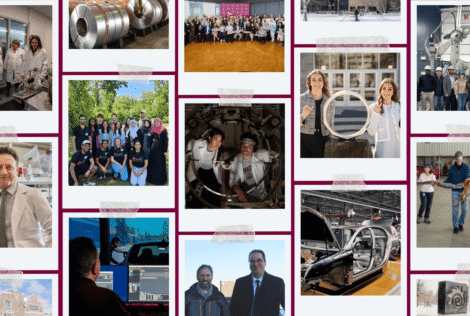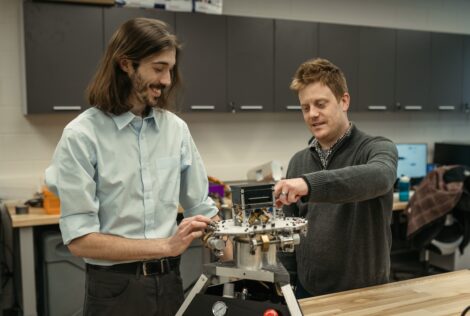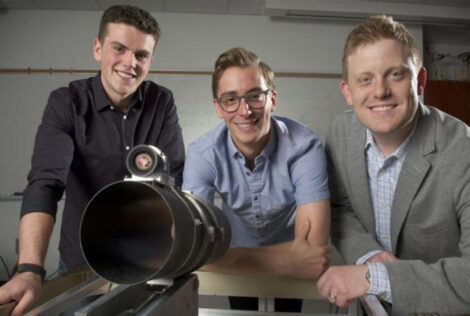
Expertise
Areas of Specialization
Research Clusters
Current status
-
Accepting graduate students
-
Associate Chair, Graduate Studies
Mechanical Engineering
-
Associate Professor
Mechanical Engineering
Overview
Dr. Gadsden’s research background and expertise includes a broad consideration of control and estimation theory, artificial intelligence and machine learning, and smart or cognitive systems. Smart systems are found everywhere in our increasingly automated and interconnected world—from smart homes to self-driving vehicles. The next-generation smart system, known as a cognitive system, is a type of system that operates in an environment with a perceived amount of cognition. These are smart systems with a higher-level of intelligence that behave autonomously. A system is deemed cognitive when capable of five fundamental processes essential to human cognition: the perception-action cycle (PAC), memory, attention, intelligence, and language. In addition, the principles of data science and security play an important role. A cognitive system is equipped to perceive and interact with the environment while it stores and learns from past experiences to adapt its operation which improves its efficiency, effectiveness, and robustness in unknown environments.
Fundamentally, the safe and reliable operation of a cognitive system is heavily dependent on its sensors, its understanding of the collected data, and its interaction with the environment. For example, estimation strategies that extract useful information from sensors must be robust to sensor failure or system uncertainties such as unmodeled dynamics. The inability to provide reliable information to the controller can lead to poor system performance, unsafe operating conditions, or failure. Based on the sensor data, a cognitive system may build its knowledge base and models using machine learning techniques. However, this generally creates models that are input-output driven with minimal information or user understanding on the dynamics of the system. Physics-based or mathematical modelling of the system are significantly more complex, but are not considered ‘black box’ models like those generated from advanced machine learning methods. This offers some advantages as the engineer or user may better understand how the system behaves. However, this raises an important question on the future of cognitive systems. Can we rely solely on a cognitive system for critical or unsafe tasks, or should they be regulated to passive actions and menial duties?
Dr. Gadsden and his research team are working towards answering this fundamental question. His team is focusing on novel and efficient ways of advancing the theory of cognitive systems while improving public confidence, acceptance, and trust in their application. In particular, he is working on developing robust estimation and control strategies to improve cognitive system performance within the perception-action cycle. Further, Dr. Gadsden and his team are fusing machine learning and physics-based modelling for improved system intelligence. Finally, he is working towards a cognitive system that is able to explain and reason its actions to improve user trust.
Did you know?
• Dr. Gadsden is a NASA award recipient. As a member and Co-PI of the air-LUSI project, Dr. Gadsden and his fellow teammates earned the 2021 Robert H. Goddard Award in Science (announced in January, 2022) for their work on developing an airborne lunar spectral irradiance instrument. This system will be used to help Earth observing sensors make more accurate measurements and will lead to improved modelling of our planet (e.g., climate change models).
• Dr. Gadsden earned the 2019-2020 University Research Excellence Award for the College of Engineering and Physical Sciences (University of Guelph, Ontario). This award is given annually to one recently tenured faculty member who has demonstrated research excellence.
• In 2019, Dr. Gadsden was awarded a SPIE Rising Researcher Award in Baltimore, Maryland. This highly-competitive award is typically given to new researchers, and was the only Canadian to earn one in 2019. Dr. Gadsden was awarded based on his work in intelligent estimation theory.
• Dr. Gadsden earned the 2019 Distinguished Professor Award for Excellence in Teaching (University of Guelph Faculty Association, Ontario). This award is given annually to one faculty member who has demonstrated excellence in teaching.
• Dr. Gadsden has been a Senior Member of the IEEE since 2019.
• In 2018, Dr. Gadsden earned an Ontario Early Researcher Award for his work in intelligent condition monitoring. Awardees are selected based on excellence of the researcher, quality of the research, development of research talent, and strategic value for Ontario. The five-year awards are typically used to help build research teams.
• Dr. Gadsden has been a Fellow of ASME since 2018.
• Dr. Gadsden and his team have published over 300 peer-reviewed journals and conference proceedings.
• Dr. Gadsden actively supports start-up companies in Advisor and Board Member roles.
• Dr. Gadsden has two cats.
Dr. S. Andrew Gadsden is an Associate Professor in the Department of Mechanical Engineering at McMaster University and is Director of the Intelligent and Cognitive Engineering (ICE) Laboratory. His research area includes control and estimation theory, artificial intelligence and machine learning, and cognitive systems. Dr. Gadsden completed his Bachelors in Mechanical Engineering and Management (Business) and then earned his PhD in Mechanical Engineering at McMaster in the area of estimation theory with applications to mechatronics and aerospace systems. He worked as a postdoctoral researcher for nearly three years at the Centre for Mechatronics and Hybrid Technology (Hamilton, Ontario). He also worked concurrently as a Project Manager in the pharmaceutical industry (Apotex Inc., Toronto, Ontario). Before joining McMaster University, Dr. Gadsden was an Associate/Assistant Professor at the University of Guelph and an Assistant Professor in the Department of Mechanical Engineering at the University of Maryland, Baltimore County (USA). He worked and continues to work with a number of colleagues in NASA, the US Army Research Laboratory (ARL), US Department of Agriculture (USDA), National Institute of Standards and Technology (NIST), and the Maryland Department of the Environment (MDE). Dr. Gadsden is an elected Fellow of ASME, is a Senior Member of IEEE, and is a Professional Engineer of Ontario. He is also a certified Project Management Professional (PMP). Dr. Gadsden is a reviewer for a number of ASME and IEEE journals and international conferences.
Dr. Gadsden has been the recipient of numerous international awards and recognitions. Most recently, in January 2022, Dr. Gadsden and his fellow air-LUSI project teammates were awarded NASA’s prestigious 2021 Robert H. Goddard Award in Science for their work on developing an airborne lunar spectral irradiance instrument. He also earned the 2019/2020 University Research Excellence Award for the College of Engineering and Physical Sciences based on his research activities at the University of Guelph. Dr. Gadsden is also a 2019 SPIE Rising Researcher award winner based on his work in intelligent estimation theory, and a 2018 Ontario Early Researcher award (ERA) winner based on his work in intelligent condition monitoring strategies. He was also awarded the 2019 University of Guelph Faculty Association (UGFA) Distinguished Professor Award for Excellence in Teaching in the College of Engineering and Physical Sciences based on his teaching effectiveness and pedagogy. Finally, Dr. Gadsden and his team have received three Best Paper Awards based on research publications.
B.Eng.Mgt., McMaster University
Ph.D., McMaster University
- 2024 Best Paper Award at the Springer International IOT, Electronics and Mechatronics (IEMTRONICS) Conference (London, UK)
- 2023 Journal Cover (Featured Article), Proceedings of the IEEE (Vol. 111, No. 6)
- 2023 Journal Cover (Featured Article), IEEE Journal of Selected Topics in Quantum Electronics (Vol. 29, No. 5)
- 2022-2023 Engineering Leadership Fellow (McMaster University, Ontario)
- 2022 Best Paper Award at the IEEE International IOT, Electronics and Mechatronics (IEMTRONICS) Conference (Toronto, Ontario)
- 2022 Journal Cover (Featured Article), ACS Journal of Chemical Information and Modeling (Vol. 61, No. 2)
- 2021-2022 NASA Robert H. Goddard Award in Science (air-LUSI Team; Greenbelt, Maryland)
- 2019-2020 University Research Excellence Award for the College of Engineering and Physical Sciences (University of Guelph, Ontario)
- 2019 Distinguished Professor Award for Excellence in Teaching (University of Guelph Faculty Association, Ontario)
- 2019 SPIE Rising Researcher Award (Society of Photo-Optical Instrumentation Engineers, Baltimore, Maryland)
- 2019 Senior Member of the Institute of Electrical and Electronic Engineers (SMIEEE)
- 2018-2023 Ontario Early Researcher Award (Ministry of Research, Innovation and Science)
- 2018 Fellow of the American Society of Mechanical Engineers (FASME)
- 2016 Best Paper Award at the SPIE Sensing for Agriculture and Food Quality and Safety VIII Conference (Baltimore, Maryland)
- 2015 Summer Faculty Fellowship Award, VP Research, University of Maryland (Baltimore, Maryland)
- 2013 Certified Project Management Professional (PMP)
- 2013 Registered as a Professional Engineer of Ontario (PEng)
- 2012 Best Paper Award at the IEEE Transportation Electrification Conference and Exposition (Dearborn, Michigan)
Please view Dr. Gadsden’s lab website for the most recent list of publications.















